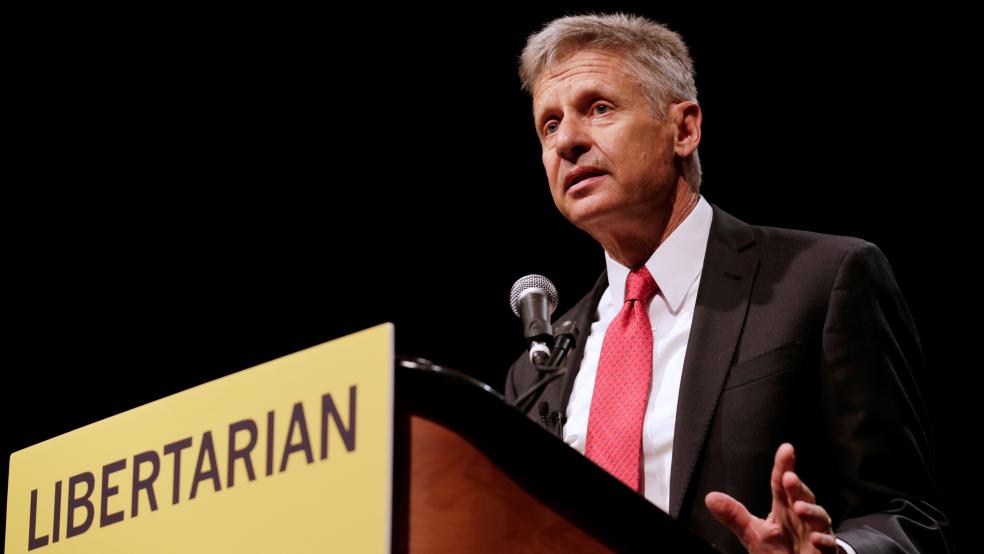Following a humiliating televised gaffe in which he couldn’t identify Aleppo as an embattled Syrian city, Libertarian presidential candidate Gary Johnson sought to reboot his campaign on Wednesday with the announcement that he will appear on the ballot in all 50 states and the District of Columbia.
Johnson, the former two-term governor from New Mexico who favors the legalization of marijuana and minimal government control, displayed his ignorance and relative indifference to foreign policy and defense issues during an ill-fated appearance last week on MSNBC’s Morning Joe program.
Related: Could Libertarian Gary Johnson Play the Spoiler in November?
But he and his running mate, former Republican Massachusetts governor Bill Weld, displayed no small political skill and organizational capability by qualifying to appear on the ballot throughout the country.
Not since 1996 has a third-party candidate appeared on every state ballot – a testament to a sophisticated and well-funded political ground game in which supporters had to collect the requisite number of valid signatures on petitions in order for Johnson to qualify for a spot on the November ballot.
Over the years, state lawmakers have developed ballot access procedures that make it difficult for third party or independent candidates to appear on the ballot. According to Ballotpedia, an on-line encyclopedia of American politics, independent candidates for president this year needed to collect in excess of 880,000 signatures overall in order to appear on the general election ballot in every state plus the nation’s capital. California demanded that independent candidates collect 178,039 signatures, more than any other state. Tennessee required just 275 signatures, the fewest of any state.
Johnson and Weld are hoping that this political feat will put added pressure on the Commission on Presidential Debates to allow Johnson on stage Sept. 26 when Democrat Hillary Clinton and Republican Donald Trump go head-to-head in the first of three nationally televised presidential debates. For now, however, Johnson is being excluded from the debate because he hasn’t reached the required 15 percent average in five major national polls since Labor Day.
Related: Third Party Candidates Johnson and Stein Suddenly Hit a Rough Patch
“The majority of the people are not happy with the two major party candidates and have been clear in their desire to hear from a credible alternative,” Johnson and Weld stated in a full page ad in today’s New York Times.
Clinton is struggling to retain a narrow lead in the polls over Trump after the latest flap over her health and her disparaging remarks about Trump’s “deplorable” supporters. Clinton and Trump are both saddled with high negative ratings and are generally not trusted by voters.
A recent Quinnipiac University national poll released Aug. 25 showed that 62 percent of voters favored Johnson taking part in the debates. Many of those calling for his inclusion are young people, Latinos and active duty members of the military.
Moreover, a recent Washington Post/SurveyMonkey poll of more than 70,000 voters showed double-digit support for the Johnson-Weld ticket in 42 states; more than 15 percent support in 15 states; and 19 percent or more support in four states.
Related: Trump Says the Debates Are Rigged. Turns Out He's Right
“We are successful governors who have achieved greater support by far in relation to campaign dollars spent than either the Republican or Democrat – and a majority of Americans want and deserve to hear what we have to say,” Johnson and Weld said in the ad, an open letter to the debate commission members.
In arguing for a spot on the debate podium later this month, Johnson said that he would be willing to forgo appearances in the second and third debates if his polling averages still haven’t reached the 15 percent standard.
Precisely how much of a factor Johnson or Jill Stein, the Green Party nominee, will be in the general election contest is open to debate. The Green Party with Stein at the top of the ticket reportedly will be on the ballot in 44 states and the District of Columbia.
Johnson and Stein appear to be having some effect on the fight over the critical swing state of Ohio. According to a new Bloomberg poll released today, Trump is leading Clinton, 44 percent to 39 percent among the state’s likely voters. Johnson picked up 10 percent of the vote and Stein received 3 percent.
Related: Your Vote for a Third Party Candidate Won’t Be a Waste in 2016
Nationally, the Real Clear Politics average of polls shows Clinton narrowly leading Trump, 41.8 percent to 40 percent, with Johnson at 9 percent and Stein at 2.8 percent.
During the most recent surveys, Johnson has toggled between 9 percent and 11 percent in a four-way presidential contest. The conventional political wisdom is that the third-party candidates probably hurt Clinton more than Trump, but probably not by much.
Nate Silver’s FiveThirtyEight politics blog in early July concluded after analyzing 18 polls that Johnson and Stein at most would take about one percentage point away from Clinton’s margin on average.
Larry J. Sabato of the University of Virginia said in an email today that “It’s very unlikely Johnson will get the 15 percent necessary to be included in the debates. His percentage of the vote may decline as Election Day approaches. It’s too early to say whether Clinton or Trump will be hurt more by the votes he receives.”





